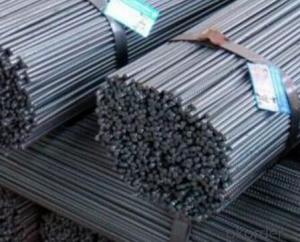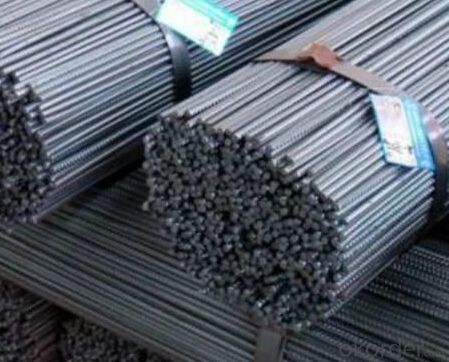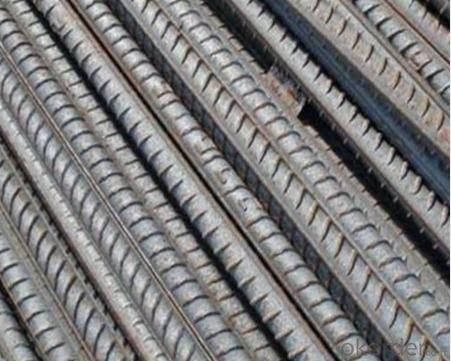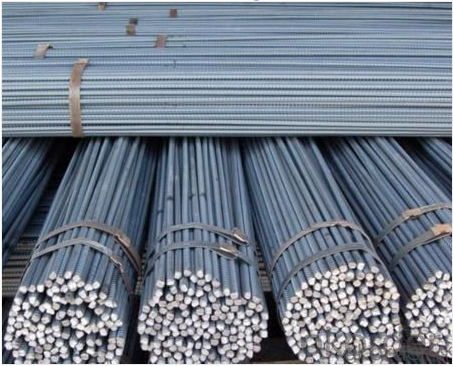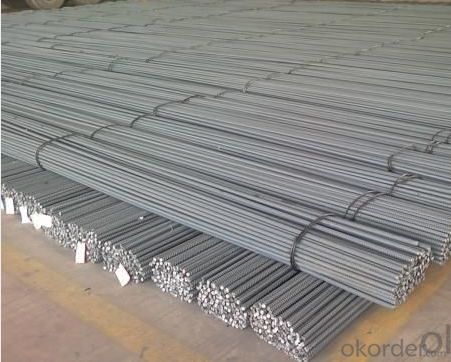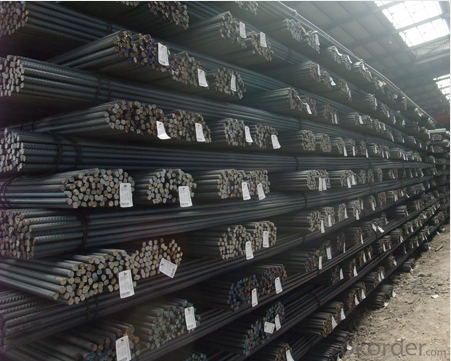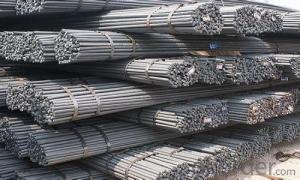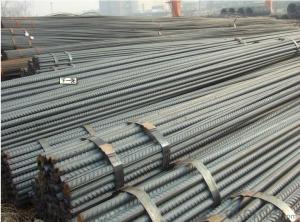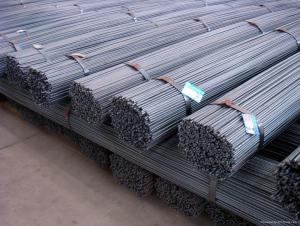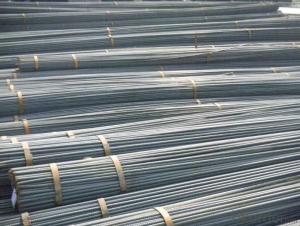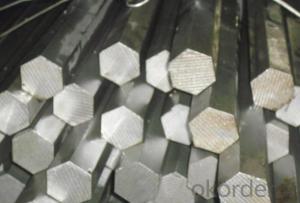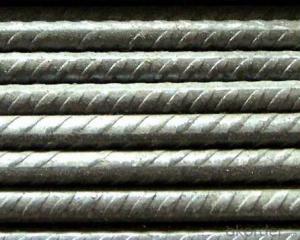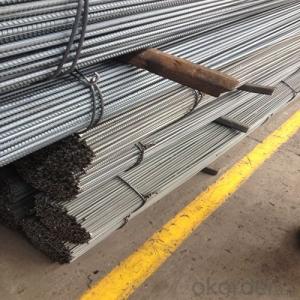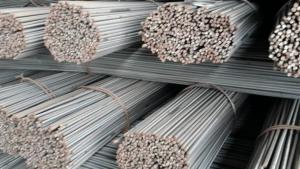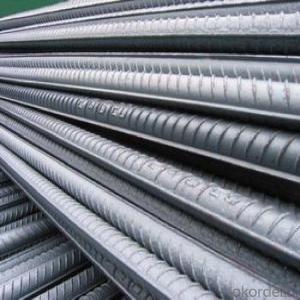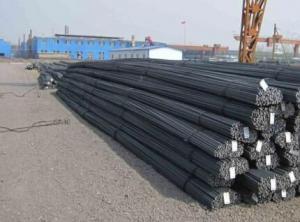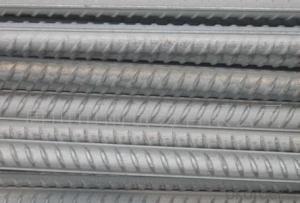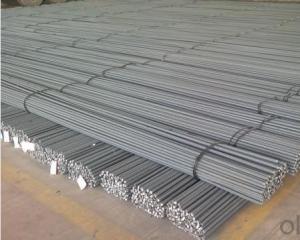Chrome Alloy Deformed Steel Bar of Hot Rolled
- Loading Port:
- Tianjin
- Payment Terms:
- TT or LC
- Min Order Qty:
- 100 m.t.
- Supply Capability:
- 50000 m.t./month
OKorder Service Pledge
OKorder Financial Service
You Might Also Like
Specification
Product Description:
OKorder is offering Chrome Alloy Deformed Steel Bar of Hot Rolled at great prices with worldwide shipping. Our supplier is a world-class manufacturer of steel, with our products utilized the world over. OKorder annually supplies products to European, North American and Asian markets. We provide quotations within 24 hours of receiving an inquiry and guarantee competitive prices.
Product Applications:
Chrome Alloy Deformed Steel Bar of Hot Rolled are ideal for structural applications and are widely used in the construction of buildings and bridges, and the manufacturing, petrochemical, and transportation industries.
Product Advantages:
OKorder's Chrome Alloy Deformed Steel Bar of Hot Rolled are durable, strong, and resist corrosion.
Main Product Features:
· Premium quality
· Prompt delivery & seaworthy packing (30 days after receiving deposit)
· Corrosion resistance
· Can be recycled and reused
· Mill test certification
· Professional Service
· Competitive pricing
Specifications of Chrome Alloy Deformed Steel Bar of Hot Rolled:
Standard | GB | HRB400 | |
Diameter | 6mm,8mm,10mm,12mm,14mm,16mm,18mm,20mm, 22mm,25mm,28mm,32mm,36mm,40mm,50mm | ||
Length | 6M, 9M,12M or as required | ||
Place of origin | Hebei, China mainland | ||
Advantages | exact size, regular package, chemical and mechanical properties are stable. | ||
Type | Hot rolled deformed steel bar | ||
Brand name | DRAGON | ||
Chemical Composition: (Please kindly find our chemistry of our material based on HRB500 as below for your information)
Grade | Technical data of the original chemical composition (%) | ||||||
C | Mn | Si | S | P | V | ||
HRB400 | ≤0.25 | ≤1.60 | ≤0.80 | ≤0.045 | ≤0.045 | 0.04-0.12 | |
Physical capability | |||||||
Yield Strength (N/cm²) | Tensile Strength (N/cm²) | Elongation (%) | |||||
≥400 | ≥570 | ≥14 | |||||
Theoretical weight and section area of each diameter as below for your information:
Diameter(mm) | Section area (mm²) | Mass(kg/m) | Weight of 12m bar(kg) |
6 | 28.27 | 0.222 | 2.664 |
8 | 50.27 | 0.395 | 4.74 |
10 | 78.54 | 0.617 | 7.404 |
12 | 113.1 | 0.888 | 10.656 |
14 | 153.9 | 1.21 | 14.52 |
16 | 201.1 | 1.58 | 18.96 |
18 | 254.5 | 2.00 | 24 |
20 | 314.2 | 2.47 | 29.64 |
22 | 380.1 | 2.98 | 35.76 |
25 | 490.9 | 3.85 | 46.2 |
28 | 615.8 | 4.83 | 57.96 |
32 | 804.2 | 6.31 | 75.72 |
36 | 1018 | 7.99 | 98.88 |
40 | 1257 | 9.87 | 118.44 |
50 | 1964 | 15.42 | 185.04 |
Usage and Applications of Chrome Alloy Deformed Steel Bar of Hot Rolled:
Deformed bar is widely used in buildings, bridges, roads and other engineering construction. Big to highways, railways, bridges, culverts, tunnels, public facilities such as flood control, dam, small to housing construction, beam, column, wall and the foundation of the plate, deformed bar is an integral structure material. With the development of world economy and the vigorous development of infrastructure construction, real estate, the demand for deformed bar will be larger and larger..
Packaging & Delivery of Chrome Alloy Deformed Steel Bar of Hot Rolled:
Packaging Detail: products are packed in bundle and then shipped by container or bulk vessel, deformed bar is usually naked strapping delivery, when storing, please pay attention to moisture proof. The performance of rust will produce adverse effect.
Each bundle weight: 2-3MT, or as required
Payment term: TT or L/C
Delivery Detail: within 45 days after received advanced payment or LC.
Label: to be specified by customer, generally, each bundle has 1-2 labels
Trade terms: FOB, CFR, CIF
FAQ:
Q1: Why buy Materials & Equipment from OKorder.com?
A1: All products offered byOKorder.com are carefully selected from China's most reliable manufacturing enterprises. Through its ISO certifications, OKorder.com adheres to the highest standards and a commitment to supply chain safety and customer satisfaction.
Q2: How do we guarantee the quality of our products?
A2: We have established an advanced quality management system which conducts strict quality tests at every step, from raw materials to the final product. At the same time, we provide extensive follow-up service assurances as required.
Q3: How soon can we receive the product after purchase?
A3: Within three days of placing an order, we will begin production. The specific shipping date is dependent upon international and government factors, but is typically 7 to 10 workdays.
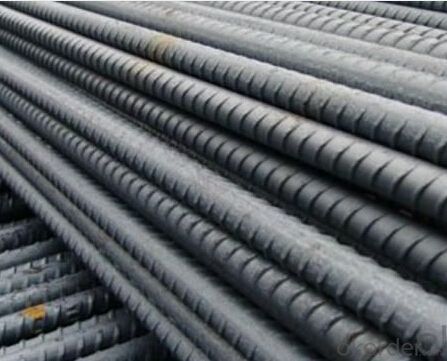
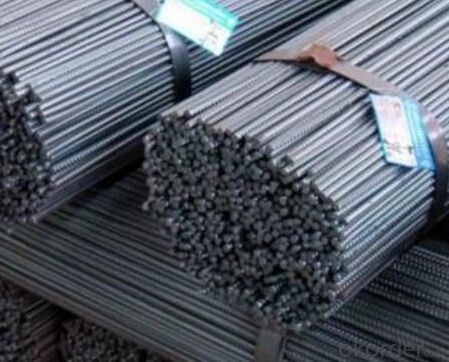
- Q: How do steel rebars resist alkali-silica reaction in concrete?
- Steel rebars resist alkali-silica reaction in concrete primarily due to their passive film and the alkaline environment of the concrete. When steel rebars are embedded in concrete, they form a passive film on their surface. This film acts as a protective layer that prevents direct contact between the steel and the aggressive alkali-silica reactive aggregates present in the concrete. This passive film is formed due to the high pH of the alkaline environment created by the cement in the concrete, which typically ranges between pH 12-13. This high pH helps in creating a protective oxide layer on the surface of the steel rebar, preventing it from coming into contact with the reactive elements in the aggregates. Furthermore, the alkaline environment of the concrete helps in maintaining the passivity of the steel rebars. The alkalinity of the concrete allows the passive film to remain stable and intact, providing a continuous barrier against the alkali-silica reaction. As long as the pH of the concrete remains high, the steel rebars will continue to resist the reaction. It is worth noting that the thickness and quality of the passive film on the steel rebars are crucial in ensuring their resistance to alkali-silica reaction. Any factors that can compromise the integrity of this film, such as carbonation or chloride contamination, may increase the risk of the reaction occurring. In summary, steel rebars resist alkali-silica reaction in concrete due to the presence of a passive film on their surface, which is formed by the alkaline environment of the concrete. This film acts as a protective barrier, preventing the steel from coming into direct contact with the reactive aggregates and thus, mitigating the likelihood of the reaction occurring.
- Q: What is the recommended minimum diameter of steel rebars used in earthquake-prone areas?
- The recommended minimum diameter of steel rebars used in earthquake-prone areas is typically 12 millimeters or larger.
- Q: How do steel rebars contribute to the load-bearing capacity of concrete slabs?
- Steel rebars contribute to the load-bearing capacity of concrete slabs in several ways. Firstly, they enhance the tensile strength of the concrete. Concrete is known for its compressive strength, but it lacks the ability to withstand tensile forces. By placing steel rebars within the concrete, it forms a reinforced structure that can resist both compressive and tensile stresses. This prevents the concrete from cracking or failing under heavy loads. Secondly, steel rebars help to distribute the load more evenly across the concrete slab. When a load is applied to a concrete slab, it tends to concentrate at certain points, causing stress concentrations. The presence of rebars helps to spread the load over a larger area, reducing the stress on any individual point and improving the overall load-bearing capacity of the slab. Moreover, steel rebars also prevent the propagation of cracks in concrete slabs. If a crack occurs in the concrete, the rebars act as reinforcement and hold the cracked sections together, preventing the crack from expanding further. This helps to maintain the structural integrity of the slab and ensures its load-bearing capacity is not compromised. In summary, steel rebars play a crucial role in enhancing the load-bearing capacity of concrete slabs by providing tensile strength, distributing loads more evenly, and preventing crack propagation. Their inclusion in concrete structures significantly improves their durability and ability to withstand heavy loads, making them essential components in construction projects.
- Q: How do steel rebars affect the cost of a construction project?
- Steel rebars can significantly affect the cost of a construction project because they are a crucial component in reinforced concrete structures. The cost of steel rebars depends on their quantity, grade, and size, and it can greatly impact the overall project budget. Additionally, the transportation and installation costs associated with steel rebars should also be taken into account. Therefore, careful planning and consideration of the type and amount of steel rebars required are essential to manage and optimize the project's cost.
- Q: How are steel rebars used in the construction of tunnels and underground passages?
- Steel rebars, also known as reinforcing bars, are indispensable in the construction of tunnels and underground passages. They provide essential strength and stability to the concrete structure. In tunnel construction, rebars are strategically placed within the concrete to reinforce it and prevent cracking or collapsing. The rebars act as a framework for the concrete, distributing the load and reinforcing its structural integrity. They are typically arranged in a grid pattern throughout the tunnel walls, floor, and ceiling. One of the main reasons for using rebars in tunnel construction is their ability to withstand tension forces. Tunnels face significant pressure from the surrounding soil and water, and without proper reinforcement, the concrete would easily crack under this pressure. By adding steel rebars, the concrete's tensile strength is greatly increased, ensuring it can withstand external forces. Furthermore, rebars also play a crucial role in controlling and preventing crack propagation. If a crack occurs, the rebars act as a barrier, preventing the crack from spreading throughout the structure. This is particularly important in tunnels and underground passages, as any weakening of the concrete could jeopardize the safety of the structure and its users. Moreover, rebars are used to reinforce specific areas of the tunnel that are more susceptible to stress, such as corners, joints, and areas where heavy equipment or vehicles may pass through. By reinforcing these critical points with steel rebars, the overall structural integrity of the tunnel is significantly enhanced. In conclusion, the use of steel rebars in tunnel and underground passage construction is essential for ensuring the strength, stability, and long-term durability of these structures. They play a vital role in preventing cracking, controlling crack propagation, and enhancing the overall durability of the concrete.
- Q: Can steel rebars be used in structures with high electromagnetic shielding requirements?
- Steel rebars can be used in structures with high electromagnetic shielding requirements to some extent. Steel is inherently a good conductor of electricity, which means it can help to divert and absorb electromagnetic waves. This property makes steel rebars helpful in reducing the penetration of electromagnetic radiation into structures. However, it is important to note that the effectiveness of steel rebars in providing electromagnetic shielding depends on various factors. The thickness and quality of the steel rebars, the design and construction of the structure, and the frequency and intensity of the electromagnetic waves all play a role in determining the level of shielding provided. In cases where extremely high electromagnetic shielding requirements are necessary, additional measures may be needed. These could include using specialized materials specifically designed for electromagnetic shielding, such as conductive coatings or composite materials with high conductivity. Moreover, it is crucial to consider the overall design and construction of the structure to ensure proper grounding of the steel rebars. Proper grounding helps to channel and dissipate the electromagnetic energy safely, preventing the buildup of potentially harmful electromagnetic fields. In conclusion, while steel rebars can contribute to electromagnetic shielding in structures, the level of shielding provided may vary depending on several factors. For structures with stringent electromagnetic shielding requirements, it is advisable to consult with experts in the field to determine the most appropriate materials and construction techniques.
- Q: Are there any alternatives to steel rebars for reinforcement?
- Yes, there are several alternatives to steel rebars for reinforcement. Some commonly used alternatives include fiberglass rebar, carbon fiber rebar, and basalt rebar. These materials offer advantages such as higher tensile strength, corrosion resistance, and lighter weight compared to traditional steel rebars. However, the choice of reinforcement material depends on the specific project requirements and considerations.
- Q: How do steel rebars prevent cracks in concrete structures?
- Steel rebars prevent cracks in concrete structures by providing reinforcement and increasing the tensile strength of the concrete. When concrete is exposed to tensile forces, such as those caused by external loads or temperature changes, it tends to crack. However, steel rebars, which are embedded within the concrete, act as a reinforcement and absorb these tensile forces. The rebars distribute the load more evenly throughout the structure, preventing localized stress and minimizing the formation of cracks.
- Q: Can steel rebars be used in coastal areas?
- Yes, steel rebars can be used in coastal areas. However, it is important to note that the rebars need to be properly coated or protected against corrosion due to the higher levels of salt and moisture in coastal environments.
- Q: How are steel rebars cut to specific lengths?
- Steel rebars are cut to specific lengths using heavy-duty tools such as hydraulic shears, manual rebar cutters, or abrasive cutting wheels. These tools provide the necessary force and precision to cut through the strong and dense steel material, allowing rebars to be cut to the desired lengths for construction purposes.
Send your message to us
Chrome Alloy Deformed Steel Bar of Hot Rolled
- Loading Port:
- Tianjin
- Payment Terms:
- TT or LC
- Min Order Qty:
- 100 m.t.
- Supply Capability:
- 50000 m.t./month
OKorder Service Pledge
OKorder Financial Service
Similar products
Hot products
Hot Searches
Related keywords
